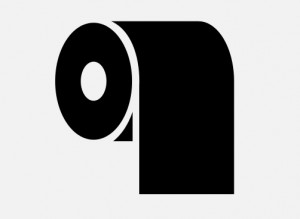 Here is a section from Résumé-Writing for Archaeologists explaining the similarities between the most of the résumés archaeologists write and toilet paper. Enjoy.
Here is a section from Résumé-Writing for Archaeologists explaining the similarities between the most of the résumés archaeologists write and toilet paper. Enjoy.
What would our lives be like without toilet paper? We don’t think about it most of the time, but toilet paper is an absolute must in American households. Other countries live without it, but most Americans would not be comfortable without it. I shudder to imagine a life without TP.
Of course, toilet paper is the epitome of disposable materials. We literally flush tons of the stuff down the toilet each year without a second thought. This disregard for toilet paper’s importance is similar to how companies think about and treat crappy résumés. Most companies can flush a bad résumé using their applicant screening software. They can get rid of the bad ones without even having to touch them, which is something we can’t do with real toilet paper no matter how much we may want to. For companies that don’t use screening software, hiring managers have other ways to discard bad résumés. Résumés with incorrect formatting, misspelled words, incorrect punctuation, and outdated information are tossed quickly; even if the applicant is experienced or skilled. If you do not have a quality, job specific résumé, you can be assured that your information will be “lost.”
How can companies afford to do this? Because there are many suitable job seekers that they can afford to discriminate based on the slightest shortcomings. Your résumé is taken as an example of your skills, attention to detail, and talents. Thus, a weak résumé is interpreted as a sign that you do not care about your work. Hiring managers are also overworked. They don’t have excess time to look at your information. In fact, many managers only take 10 to 20 seconds to look at your résumé! It is a sad fact, but for the best job postings, there may be hundreds of folks applying to the same job. Many of those applicants could do the job as well if not better than you could.
Your task is to build a résumé that: 1) catches the attention of the folks hiring, 2) makes you look like the best, or only, person for a given position, 3) and sells your talents in a manner that interests the hiring manager enough to contact you. Résumés this tight are rare, which is one reason why so many people are having trouble landing jobs.
Other ways bad résumés are similar to toilet paper? I can think of three good reasons:
Change the roll– Résumés come in different grades of quality. Legend has it that toilet paper sales in the United States skyrocketed when the Sears, Roebuck, and Company catalogue went glossy during the early twentieth century. Why? The new catalog paper was coated with clay and crumbled with moisture. Well who wants to wipe with crumby, itchy paper?
Until that time, many Americans seemed to have been okay with the stiff, harsh, unfriendly paper of the Sears, Roebuck and Company catalog for many years. But when they went to a less-friendly form of paper everyone adjusted. Even today, most toilet paper aficionados don’t use the low-grade stuff unless absolutely necessary.
This principal applies to résumés. For a long time, many of us could get by with résumés that were lacking– stale, boring documents that did not do our character any justice. It didn’t really matter because we could always use our personal connections to compensate. A shout out from a former professor, friend, or co-worker had much more weight than a simple résumé, so we didn’t strive for a quality document. Also, until recently, companies did not have global, 24-hour access to information about thousands of prime applicants they could convince to work for them.
Times have changed and stiff, old résumés won’t cut it anymore. Most companies are not interested in filling their scarce positions with anything except the best applicants. And the best applicants are usually determined by those with the most convincing résumés, cover letters, and interviews. If you want to have a ghost of a chance at a job in this climate, you’ll need a high-quality résumé that conveys how your skills will help the company.
Toilet paper alone won’t do– Imagine what would happen if you only used toilet paper to clean after yourself and didn’t use anything else. What if you didn’t clean back there while taking a shower because you treated TP as your sole cleaning agent? And, you kept doing this for weeks, months, even years? What do you think would happen? At the minimum you’d have a rash in a place you don’t want one. Worst-case scenario: you are laying face down on an examination table in the doctor’s office trying to explain your actions.
A résumé isn’t a panacea. Except in certain cases, you can’t get a job with your résumé alone and you don’t have a very good chance with a standard résumé. Most of the time you’re going to have to summon all your skills (or hire someone else’s), work your network, advertise yourself, AND have a killer résumé if you want to skip to the head of the pack (The basics of a successful job hunting campaign are also outlined later in this book). The résumé you write using this book is just one tool in your arsenal, although it may be your most important one.
Grade ‘A’ usually works best– Only the cheapest businesses use single-ply toilet paper and only the laziest job seekers use a generic résumé. Toilet paper comes in all sorts of grades, colors, textures, and thicknesses, but the higher grade papers do the job best. Advertising can do much to make us aware of the differences between all the many toilet paper brands, but, ultimately, we know the higher quality papers will do the job best.
This is the same with your job search. Most companies know that anyone with the right experience and education will do for their needs. It’s your job to convince them that you’re the best; the right fit for that specific job position. You most likely will not get an interview if you don’t optimize your résumé to each specific job posting, if you neglect to integrate important keywords from the job posting, if you don’t tell them exactly how you can solve their problems, or if you don’t write each résumé to get the attention of a specific hiring manager. A ‘Grade -A’ résumé works best.
A killer résumé allows you to truly express what it is that makes you different. It boils down your achievements into an enticing advertisement that seems to speak to each hiring manager. Today, all of the excellent résumés will be skimmed from the top of the résumé heap or sorted through a company’s applicant tracking software, and the interviews will be given to many of those “top applicants.” The “top applicants” are increasingly those that have optimized their job search, built a quality personal advertisement and cultivated relationships with the right people.
Today, you’ve got to differentiate yourself from the crowd. Single-ply résumés won’t do. Building a killer résumé designed specifically for the company and their hiring manager’s needs is one way to do that.
If you have any questions or comments, write below or send me an email.
 Small Archaeology Project Management is now on the Kindle Store. Over 300 copies were sold in the first month! Click Here and see what the buzz is all about
Small Archaeology Project Management is now on the Kindle Store. Over 300 copies were sold in the first month! Click Here and see what the buzz is all about
Watch for my newest eBook “Resume-Writing for Archaeologists” and get detailed instructions on how you can land a job in CRM archaeology!
Join the Succinct Research email list and receive additional information on the CRM and heritage conservation field.


